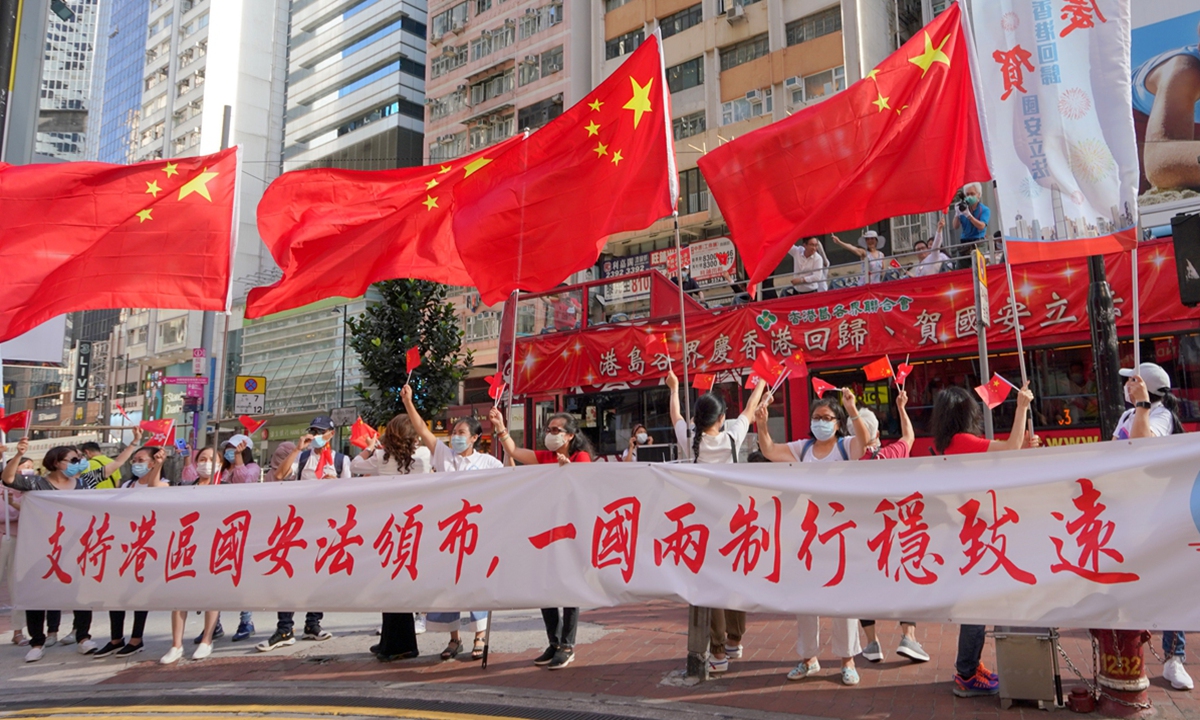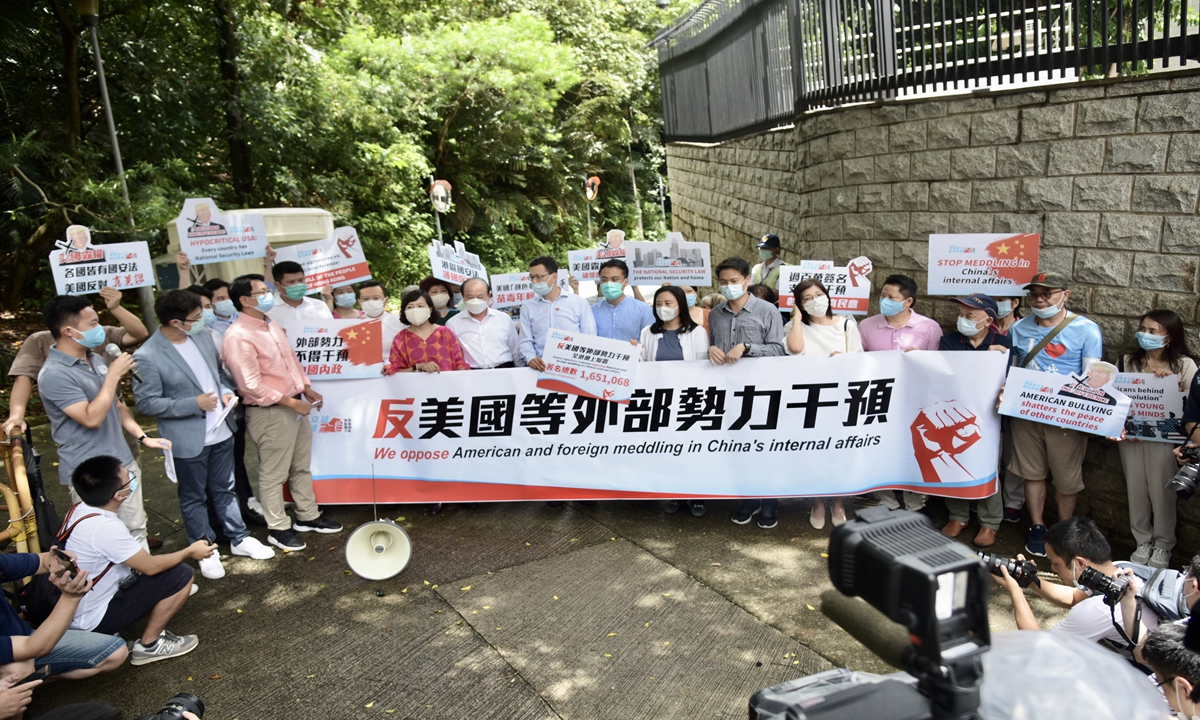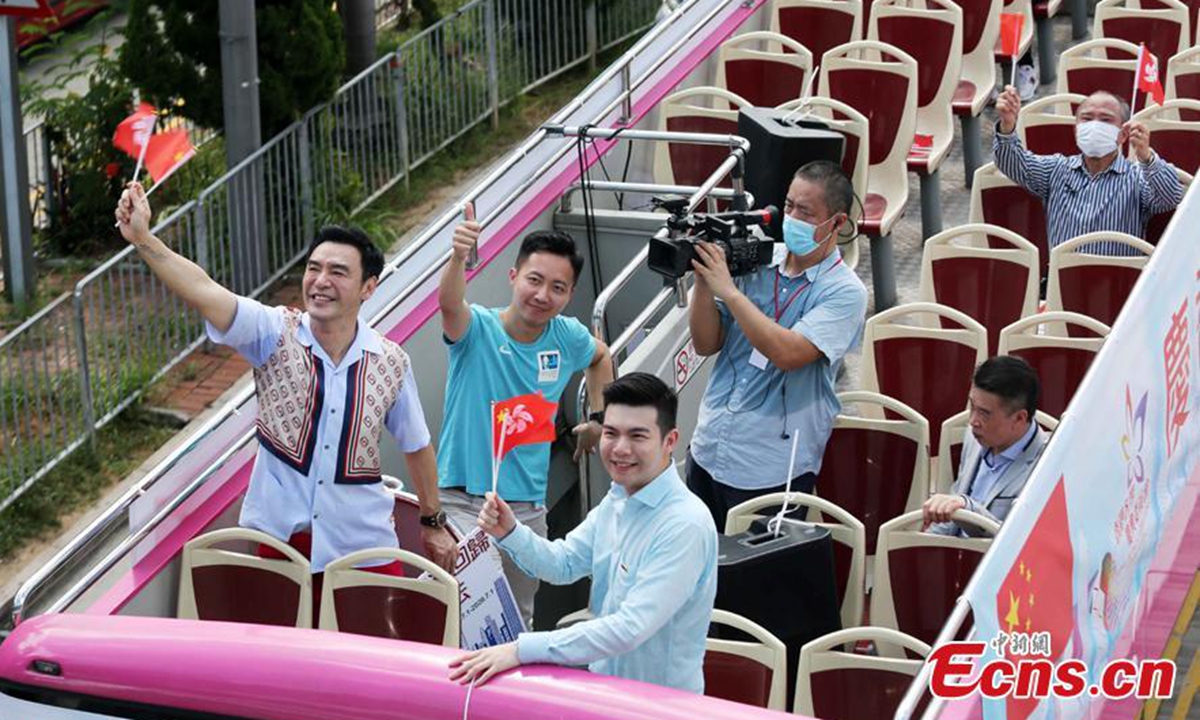Article 43 rules clarified
By Cao Siqi, Wang Wenwen, Fan Lingzhi and Zhao Juecheng Source: Global Times Published: 2020/7/8 0:08:40
Conform to city’s legal system, protect human rights

Hong Kong citizens on Tuesday gather to support the National Security Law for Hong Kong. Photo: cnsphoto
After the implementation rules for Article 43 of the national security law for Hong Kong, which aims to further provide legal guarantees for police to apply the law and safeguard national interests, were gazetted Monday evening and took effect on Tuesday, misunderstandings and vicious instigations have flooded the internet, to which the HKSAR Chief Executive and experts clarified that the rules conform to the city's legal system, while safeguarding human rights.
Noises circulating online on the rules claimed that they grant police new powers, such as raiding without a court warrant and ordering internet firms to remove content, or seizing their equipment. Hong Kong-based South China Morning Post described the new rules "scary" as the power to the police force is normally guarded by the judiciary, citing a barrister, while US news outlet ABC News said Hong Kong is grappling with a future under the law, and deliberately portrayed the city a secure land with people who enjoyed enough freedoms a year ago, implying that the law disrupted the people's lives. Some Western politicians said the law infringe upon human rights and will cause social panic.
Chief Executive Carrie Lam said at Tuesday's press conference that the national security law for Hong Kong is a mild law that only deals with imminent criminal behavior, stressing that the law will not create fear but restore stability to the city.
"The seven measures in the implementation rules clearly stipulate that the law respects human rights. If the public observes the law, there is no need to worry," Lam said.
Experts from Hong Kong and the mainland hailed the efficiency and close cooperation between the central government and the HKSAR government, and stressed that five out of the seven measures in the rules are based on Hong Kong's existing laws, while only two were added to fill the enforcement gap, as the city lacks a law on cyber security.
As the national security law started to take effect, some vague areas required specific rules. Experts predicted that similar implementation rules for other crucial articles of the law may come out in the near future, while some said there was no need for further implementation rules as they believe more details could be expected from the legislation of Article 23 of the Basic Law by the HKSAR government.

A group of Hong Kong residents gather outside the US Consulate General Hong Kong and Macao in Central Hong Kong to protest against US interference in China's domestic affairs and Hong Kong affairs on Thursday. Photo: cnsphoto
Removing constraints
Just as the four types of crimes defined by the national security law for Hong Kong are highly targeted in reality, the implementation rules also clearly lift law enforcement constraints faced by Hong Kong during the turmoil and chaos that plagued the city for almost a year.
The rules specify seven measures for police enforcement, including a search of places for evidence without a warrant under particular circumstances; restriction on persons under investigation from leaving Hong Kong; freezing, restraint, confiscation and forfeiture of property related to offenses endangering national security; removal of messages endangering national security and request for assistance; requiring political organizations and agents of foreign countries and China's Taiwan to provide information on activities concerning Hong Kong; application on authorization for interception of communications and covert surveillance; and a requirement to furnish information and produce materials.
When asked whether the rules are equal to giving more powers to the police and government, Lam dismissed the confusion, saying that the situation is just the opposite. "Without the rules, it could say that the police enjoy absolute power," Lam said.
To safeguard human rights, the rules provide the circumstances under which the police can enforce the law. "The most important thing is to let time and facts show that when the regulations are strictly implemented, everyone's doubts will be dispelled," she said.
Tang Fei, a member of the Chinese Association of Hong Kong and Macao Studies, told the Global Times the implementation rules cannot be regarded as an expansion of police power. Apart from the two measures, which come directly from the national security law, the other five were seamlessly "transplanted" from Hong Kong's existing laws.
The two measures refer to the right to remove messages endangering national security, and request for assistance and authorizing the interception of communications and covert surveillance.
"The first measure could not be interpreted as hindering freedom of speech as it is targeted against those who endanger national security instead of local resident's speech," Tian Feilong, a legal expert on Hong Kong affairs at Beihang University in Beijing, told the Global Times, explaining that the removal of online information has certain standards, and requires the approval of the security bureau head.
It targets those who hype violence to promote terrorism, Kennedy Wong Ying-ho, a solicitor at the Supreme Court of Hong Kong, told the Global Times.
The measure fills the gap left by the absence of a Hong Kong cyber security law. Some social media applications developed by US companies have become platforms to launch a color revolution. That's alarming, Wong said.
Internet supervision is a common means in national security laws across the world, including the US, and the police have the duty to supervise the internet, Tian noted.
It is noteworthy that Article 43 "requires foreign political organizations, foreign authorities or political agents to provide information," while the implementation rules highlights Taiwan, which experts said is aimed at the "Taiwan secessionists" who infiltrated Hong Kong during the turmoil, which can deter them and serve as a warning against collusion between Hong Kong and Taiwan secessionists.

People take part in a parade in Hong Kong, July 1, 2020. The Hong Kong Celebrations Association, a non-profit organization, held various activities on Wednesday to celebrate the passage of the Law of the People's Republic of China on Safeguarding National Security in the Hong Kong Special Administrative Region (HKSAR) and the 23rd anniversary of Hong Kong's return to the motherland. (Photo/China News Service)
More to come
Echoing Lam, Wong stressed that compared to national security laws in other countries, the law for Hong Kong is mild as it has no retroactive effect, and no death penalty.
"The Hong Kong stock surge and the peaceful and stable life enjoyed by residents defy predictions of the death of the city in the wake of the law," Wong said.
Tian predicted that the implementation rules for Article 43 may be further supplemented, and similar rules for Article 53, which touches on the duties of the central government's office for safeguarding national security in HKSAR, may come out in near future.
The office will use Metro Park Hotel in Causeway Bay as a temporary site, and an opening ceremony will be held on Wednesday morning, Ming Pao newspaper reported.
Article 53 stipulates that the central government's office for safeguarding national security in HKSAR shall establish a mechanism of coordination with Hong Kong's committee for safeguarding national security, to oversee and provide guidance on the work of HKSAR for safeguarding national security.
The working departments of the office shall establish mechanisms for collaboration with the relevant authorities of the region responsible for safeguarding national security to enhance information sharing and operations coordination, it says.
"The implementation rules on the office's right to supervision, working mechanism on information sharing, and operations coordination with regional departments may come out to respond to misunderstandings and erase the mystery of the office's authority," Tian said.
Although the rules cannot deal with previous cases, they can help prevent future riots. "Once violence happens and the regional government cannot deal with it, the office can take over," Tian said.
However, some legal experts also said that there is no need for implementation rules for other articles of the national security law, as the law is detailed enough. They believe more details could be expected from the legislation of Article 23 of the Basic Law by the Hong Kong SAR government in the future.